Assemblymember McMahon: Assembly’s Well-Rounded Budget Funds Vital Community Services, Education Programs
Assemblymember Karen McMahon (D-Amherst/Pendleton) announced that she helped pass the Assembly’s 2019-20 state budget proposal, which includes critical support for local school districts and municipalities and direct care professionals.
“Even though I am new to the Assembly, I was committed to ensuring that Western New York’s priorities were heard loud and clear when crafting this year’s Assembly budget proposal,” McMahon said. “I helped make sure what matters most to our families is at the forefront – from schools to those who care for our most vulnerable.”
Included in this year’s Assembly budget is $28.4 billion for education, an increase of $1.6 billion over last year. The Assembly budget also rejects the executive proposal limiting STAR growth and lowering the income-eligibility level. This will help school taxes remain affordable, noted McMahon.
To support higher education, the Assembly’s proposal also includes $12.8 million for SUNY in increased operating support and $500 million in critical maintenance funding for expansion projects. It also provides $12.1 million for community college base aid, bringing the total rate to $2,947 per full-time equivalent (FTE) student, and ensures a college doesn’t lose more than 2 percent of its state support in a given year.
“These funding sources will provide significant support to our kids, from the time they enter kindergarten all the way through college,” McMahon said. “We need to deliver on our end so that students have access to quality classes and programs that give them a pathway to their dream jobs.”
The Assembly’s budget proposal also restores vital funding for local towns and villages by restoring $59 million in Aid and Incentives to Municipalities (AIM) that was cut in the executive budget.
McMahon has been outspoken against the proposed cuts to AIM funding, which would affect the towns of Amherst and Pendleton and the village of Williamsville.[1] With local governments across the state working hard to craft balanced budgets that continue to keep property taxes down and provide important services to residents, the elimination of AIM funding would cut a revenue stream local governments rely on, leaving municipalities scrambling to fill the gaps, McMahon noted.
Additionally, the Assembly’s budget supports direct care workers by providing $25 million to increase the minimum wage for health and human services workers who contract with the state. It also provides $14.6 million for salary increases for direct care professionals and clinical staff employed by the Office of Mental Health (OMH), Office of Alcoholism and Substance Abuse Services (OASAS) and Office for People with Developmental Disabilities (OPWDD).
“Direct care professionals look after the most vulnerable folks in our communities, going above and beyond to ensure they’re safe and healthy,” McMahon said. “For their hard work and the long hours they put in, giving these caring and selfless individuals a living wage to support their own families is the least we can do.”
